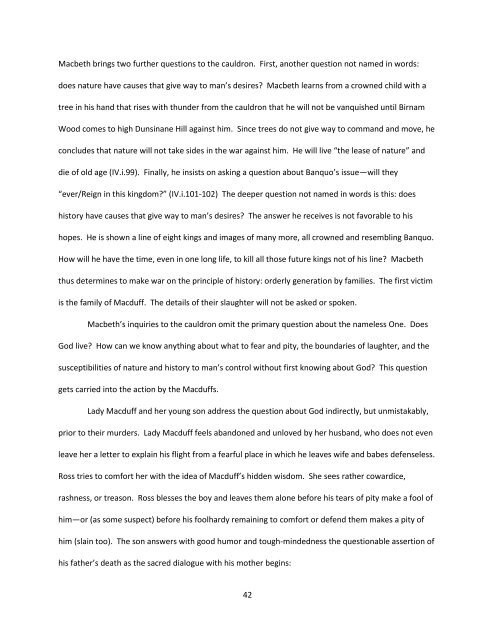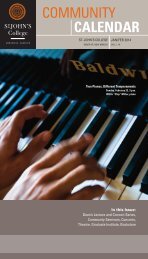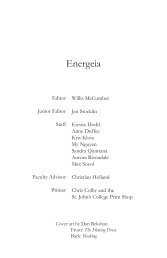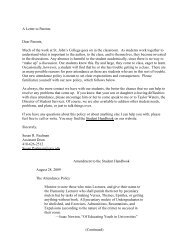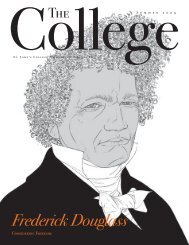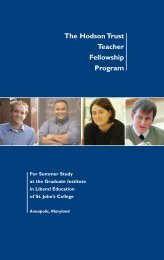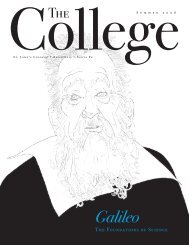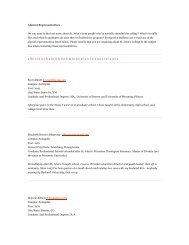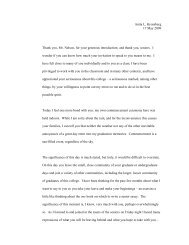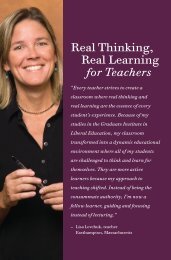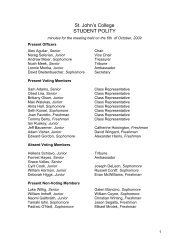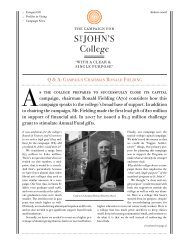âTo Meet with Macbeth,â given by tutor Louis ... - St. John's College
âTo Meet with Macbeth,â given by tutor Louis ... - St. John's College
âTo Meet with Macbeth,â given by tutor Louis ... - St. John's College
Create successful ePaper yourself
Turn your PDF publications into a flip-book with our unique Google optimized e-Paper software.
<strong>Macbeth</strong> brings two further questions to the cauldron. First, another question not named in words:<br />
does nature have causes that give way to man’s desires? <strong>Macbeth</strong> learns from a crowned child <strong>with</strong> a<br />
tree in his hand that rises <strong>with</strong> thunder from the cauldron that he will not be vanquished until Birnam<br />
Wood comes to high Dunsinane Hill against him. Since trees do not give way to command and move, he<br />
concludes that nature will not take sides in the war against him. He will live “the lease of nature” and<br />
die of old age (IV.i.99). Finally, he insists on asking a question about Banquo’s issue—will they<br />
“ever/Reign in this kingdom?” (IV.i.101-102) The deeper question not named in words is this: does<br />
history have causes that give way to man’s desires? The answer he receives is not favorable to his<br />
hopes. He is shown a line of eight kings and images of many more, all crowned and resembling Banquo.<br />
How will he have the time, even in one long life, to kill all those future kings not of his line? <strong>Macbeth</strong><br />
thus determines to make war on the principle of history: orderly generation <strong>by</strong> families. The first victim<br />
is the family of Macduff. The details of their slaughter will not be asked or spoken.<br />
<strong>Macbeth</strong>’s inquiries to the cauldron omit the primary question about the nameless One. Does<br />
God live? How can we know anything about what to fear and pity, the boundaries of laughter, and the<br />
susceptibilities of nature and history to man’s control <strong>with</strong>out first knowing about God? This question<br />
gets carried into the action <strong>by</strong> the Macduffs.<br />
Lady Macduff and her young son address the question about God indirectly, but unmistakably,<br />
prior to their murders. Lady Macduff feels abandoned and unloved <strong>by</strong> her husband, who does not even<br />
leave her a letter to explain his flight from a fearful place in which he leaves wife and babes defenseless.<br />
Ross tries to comfort her <strong>with</strong> the idea of Macduff’s hidden wisdom. She sees rather cowardice,<br />
rashness, or treason. Ross blesses the boy and leaves them alone before his tears of pity make a fool of<br />
him—or (as some suspect) before his foolhardy remaining to comfort or defend them makes a pity of<br />
him (slain too). The son answers <strong>with</strong> good humor and tough-mindedness the questionable assertion of<br />
his father’s death as the sacred dialogue <strong>with</strong> his mother begins:<br />
42


